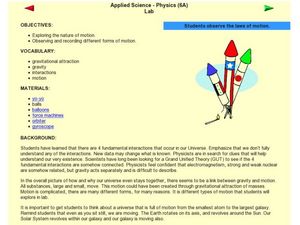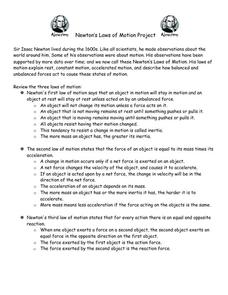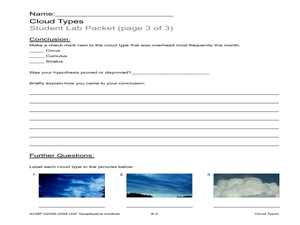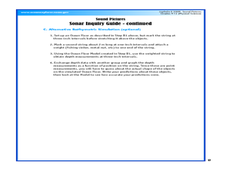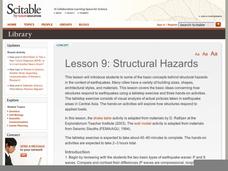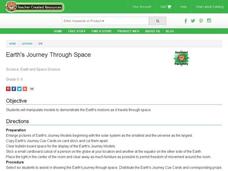Teach Engineering
Physics Tug of War
Slide books with a little assistance from Newton. Using books, groups create a demonstration of Newton's Second Law of motion. Pupils compare the distance traveled by one and two books when they apply a force to them.
Curated OER
Forces and Motion Scavenger Hunt
Students determine how force on an object affects its movement. In this force and motion lesson, students take digital pictures of objects in the school setting that are pushed and pulled. They develop a presentation using the digital...
Curated OER
Motion Experiment
Learners experiment with the laws of motion. In this motion instructional activity, students explore Newton's Laws of Motion. Learners work in groups experimenting with different objects and observing different types of motion.
Sharp School
Newton’s Laws of Motion Project
After a review of all three of Newton's laws, physical scientists complete a choice project. They can create a book in which they collect pictures where the laws of motion are depicted, produce a PowerPoint presentation, or produce a...
Cornell University
The Physics of Bridges
Stability is key when building a bridge. Scholars explore the forces acting upon bridges through an analysis of Newton's Laws and Hooke's Law. The activity asks individuals to apply their learning by building a bridge of their own.
Curated OER
Cloud Types
Students examine cloud types. In this cloud lesson, students identify cloud types, observe clouds and collect data, and analyze data to identify the most common cloud they observe overhead during the course of a month.
LABScI
Catapult: Flight of the Marshmallows
Watch your marshmallows fly. The engaging STEM activity has groups create a catapult to launch marshmallows. After testing their prototypes, they consider improvements and redesign their catapults.
World Wildlife Fund
Land of the Midnight Sun
From days of 24 hour sunlight, to endless nights that last for days, the Arctic is a very unique place to live. Examine the seasonal changes that occur in the northern-most reaches of the globe and the impact they have on the plants and...
Curated OER
UFOs
Students, in groups, construct a catapult. Then they conduct a series of experiments by catapulting a marshmallow, using different lengths of spoons, across the room. They predict, measure, and record the measured distance on a worksheet.
Curated OER
Ocean Exploration: Shapes and Patterns Under the Sea
So many shapes in our vast oceans. Young explorers can discover new shapes in a variety of ways in this lesson. One way is having free exploration with a pattern shape kit handed out by the teacher. Another is by viewing a...
Curated OER
Using A Video Camera In the Physics Classroom
Students use video cameras as a way to analyze and understand motion. In this motion lesson students complete an activity that helps them better understand motion and calculate time.
Alabama Learning Exchange
Investigating Friction
Young learners explore friction. They view a video or DVD (bibliography provided) and define terms related to friction, and work in groups to experiment with the effects of friction on speed and motion using ramps and toy cars.
Curated OER
Sound Pictures
Students examine the components of a sonar system. In this physical science lesson plan students explain how multibeam and sidescan sonar systems are useful to ocean explorers. Students simulate sonar operations in an activity...
Royal Society of Chemistry
States of Matter 2
While scientists have identified seven states of matter, these puzzles cover the most common three. Scholars match the properties, particle motion, and particle picture to each type of matter. Three Sudoku-style puzzles review the data...
Nature
Structural Hazards
The scientific explanation of seismic waves is detailed in the introduction. A fictional scenario is also provided for your class to discuss. Pictures and handouts that are meant to be included, however, they are not accessible....
Curated OER
Sky Pictures
Students investigate constellations. In this space science lesson, students view transparencies of constellations and identify the zodiac constellations. Students research the legends connected with the constellations.
Curated OER
Identifying Fossils
Learners create model fossils. For this fossils lesson, students view pictures of fossils and compare and contrast these fossils. Learners read about fossils and create a database chart with the facts they learn. ...
Curated OER
Full of Hot Air
Students investigate technology and its many designs to make our lives easy. In this science lesson, students build a hot air balloon and answer specific questions about weight and rides in the hot air balloon. They analyze their data...
Curated OER
Levers
Fifth graders participate in a review discussion of the parts of a lever, resistance or load, fulcrum, and effort. Next, they complete activities at six experiment stations while collecting data that they share with the class. While...
Messenger Education
Cooling with Sunshades
Messenger's sun shade measures 8 ft x 6 ft and will have temperatures reaching 700 degree Fahrenheit on the outside while maintaining a cool 70 degrees underneath. In the third activity of four, groups discuss the basic properties of...
Space Awareness
Let's Break the Particles
Build learning by breaking atoms! Young scientists study the way energy changes with a hands-on activity. As they roll steel marbles down a ramp, learners test the hypothesis that kinetic energy does not go away with friction...
Curated OER
Earth's Journey Through Space
Students arrange various pictures of the Earth to identify its journey through space. In this Earth's rotation lesson plan, students use models of the Earth and demonstrate its journey through space. Students complete the worksheet about...
Curated OER
Buoyant Force
Students investigate the scientific concept of why some objects float when put in a liquid solution. They apply the laws of motion and force while conducting classroom activities. Students also take notes and answer target questions to...
Curated OER
Discovering Planet X
Students investigate the movements of the planet Pluto. Students participate in a hands-on activity to record data similar to the movements of the planet Pluto. Students compare their data to that found on a website.


